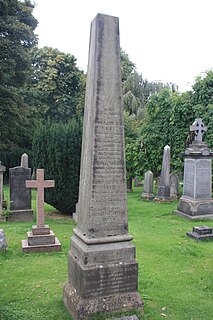
Victor Alexander John Hope, 2nd Marquess of Linlithgow, was a British Unionist politician, agriculturalist, and colonial administrator. He served as Governor-General and Viceroy of India from 1936 to 1943. He was usually referred to simply as Linlithgow.

Dr William Roxburgh FRSE FRCPE FLS was a Scottish surgeon and botanist who worked extensively in India, describing species and working on economic botany. He is known as the founding father of Indian botany. He published numerous works on Indian botany, illustrated by careful drawings made by Indian artists and accompanied by taxonomic descriptions of many plant species. Apart from the numerous species that he named, many species were named in his honour by his collaborators.

Rev Prof John Fleming DD FRSE FRS FSA was a Scottish Free Church minister, naturalist, zoologist and geologist. He named and described a number of species of molluscs. During his life he tried to reconcile theology with science.

Sir Thomas Walter Bannerman Kibble,, was a British theoretical physicist, senior research investigator at the Blackett Laboratory and Emeritus Professor of Theoretical Physics at Imperial College London. His research interests were in quantum field theory, especially the interface between high-energy particle physics and cosmology. He is best known as one of the first to describe the Higgs mechanism, and for his research on topological defects. From the 1950s he was concerned about the nuclear arms race and from 1970 took leading roles in promoting the social responsibility of the scientist.

Sir David James Wallace, CBE, FRS, FRSE, FREng is a British physicist and academic. He was the Vice-Chancellor of Loughborough University from 1994 to 2005, and the Master of Churchill College, Cambridge from 2006 to 2014.

Sir Thomas Henry Holland was a British geologist who worked in India with the Geological Survey of India, serving as its director from 1903 to 1910. He later worked as an educational administrator at Edinburgh University.

Sir Alexander Grant, 10th Baronet, FRSE was a Scottish baronet, landowner and historian who served Principal of the University of Edinburgh from 1868 to 1884. He had strong links to India, especially Bombay.
Ramaswamy S. Vaidyanathaswamy (1894–1960) was an Indian mathematician who wrote the first textbook of point-set topology in India.

Hugh Francis Clarke Cleghorn of Stravithie, FRSE FLS LLD was a Madras-born Scottish physician who worked in India and pioneered as a botanist and in forest conservancy. Cleghorn, sometimes known as the father of scientific forestry in India, was instrumental in the creation of the forest department in the Presidency of Madras. The plant genus Cleghornia was named after him by the botanist Robert Wight. Cleghorn returned to Scotland in 1869 and developed forestry education in Scotland and established a lecturership at the University of Edinburgh.
Ramamurthi Balasubramaniam was an Indian neurosurgeon, author, editor, a pioneer in neurosurgery in India and often recognized as the Father of Neurosurgery of India. He set up the Department of Neurosurgery at the Government General Hospital, Chennai in 1950, the Department of Neurosurgery at the Madras Medical College and founded the Institute of Neurology, Madras in the 1970s. He was awarded the Padma Bhushan and the Dhanvantri Award for his contribution to the field of Neurosurgery in India.
Very Rev Dr William Miller DD LLD was a Scottish educationalist and Free Church of Scotland missionary to Madras. He was also a member of Madras Legislative Council for four terms—in 1893, 1895, 1899, and 1902.
Natesan Rangabashyam (1936–2013), popularly known NR, was an Indian surgical gastroenterologist and medical academic, known for his pioneering efforts in the fields of surgical gastroenterology and proctology in India. He was known to have established the department of Surgical Gastroenterology at Madras Medical College and introduced the first MCh course in Surgical Gastroenterology in India. A former honorary surgeon to the President of India, he received B. C. Roy Award, the highest Indian award in the medical category, twice. The Government of India awarded him the third highest civilian honour of the Padma Bhushan, in 2002, for his contributions to medical science.

Prof John Robertson Henderson CIE FRSE FZS FLS was a Scottish zoologist and antiquary. From 1892 until 1911 he was Professor of Zoology at Madras Christian College in India. From 1908 to 1920 he was Superintendent of the Government Museum in Madras.
Dr Alexander Kennedy MD FRSE FSA (1764-1827) was a Scottish surgeon and antiquary.

Very Rev Dr Dugald Mackichan FRSE DD LLD (1851–1932) was a Scottish minister and missionary in India. He was also a physicist. He was Vice Chancellor of the University of Bombay 1888 to 1891 and Mackichan Hall there is named in his honour. He served as Moderator of the General Assembly of the United Free Church of Scotland in 1917.
Dr William McRae FRSE CIE was a Scottish botanist specialising in fungi and lichens. He is largely remembered for his extensive work in India.
Prof Edward Burns Ross FRSE was a 20th-century Scottish mathematician.

Prof John Edward Aloysius Steggall ARIBA FRSE LLD (1855–1935) was an English mathematician and professor at the University College, Dundee.
Sir Robert George Allan was a British agricultural administrator in British India.
Professor Charles Michie Smith CIE FRSE was a 19th century Scottish astronomer. He founded the Kodaikanal Solar Observatory in the mountains of south India and served as its first Director.












